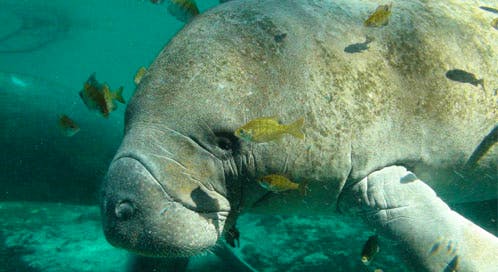It’s hard to imagine cold water and wintry months as the summer swelters on, but Defenders’ team of marine mammal experts are working right now to protect endangered Florida manatees during their winter respite in Three Sisters Springs in Florida’s Crystal River National Wildlife Refuge. Manatees depend on warm water habitat in the winter. If the water gets cold enough (below 68 degrees F), they can go into shock, and even die, as hundreds did during an extremely cold winter in 2010. So in winter, they gather in warm springs closer to shore. Since human development has taken over many of these warm spring habitats that manatees once relied upon, the animals are forced to crowd into the few remaining natural habitats, like Three Sisters Springs part of the Crystal River National Wildlife Refuge complex.
So many manatees gathered in one place is a sight that attracts hundreds of tourists, who often crowd the 1.5 acre spring to be near them. But if there is too much crowding or commotion, people can actually drive the manatees back out into the cold waters, and away from the warmer areas they need. Manatees flock to the warm springs to rest and conserve energy, but exuberant swimmers and kayakers, hoping to catch a glimpse or touch a manatee, disturb the animals and disrupt their natural behaviors, including nursing their young.
(story continues below)

Crystal River National Wildlife Refuge was established specifically to protect manatees. Yet its current set of rules falls far short of providing a safe haven for them in winter. Fortunately, on August 5th, the U.S. Fish and Wildlife Service (FWS) proposed new restrictions on people swimming with manatees during the winter months in Three Sisters Springs.
FWS is considering three options, ranging from the unregulated status quo to prohibiting all in-water interactions between humans and manatees. The agency prefers the middle ground, which would limit the number of swimmers, but not eliminate human-caused disturbances. We think that protections need to be stronger for these imperiled animals, especially when they’re at their most vulnerable. In winter months, manatees need to be able to keep warm and rest somewhere safe, without the possibility of being disturbed. We’re asking the FWS to provide the most protection possible for the manatees, which would mean closing the springs to in-water viewings during the manatees’ winter stay (November 15 – March 31). Tourists could still view manatees from the long boardwalk. The new restrictions would also be less complicated for the refuge staff to enforce. Everybody wins— especially the manatees.
These protections are long overdue. Right now, Three Sisters Springs, one of the top winter refuge spots for manatees, is the only confined water body in the U.S. that is open to the public when manatees are present. This makes it both one of the most important places for manatees to seek refuge, but also one where they are not afforded the protection that they are supposed to have. The Endangered Species Act and the Marine Mammal Protection Act both make it illegal to harm or harass manatees, but it’s clear that human disturbances certainly harass them (intentionally or not), and can absolutely cause harm if manatees are forced back into colder water before they’re ready, or if calves are separated from their mothers.
FWS has the authority and the obligation to make these changes, and we hope they will do so immediately. Although non-threatening and slow-moving, manatees are still wild animals and enter Three Sisters Springs seeking refuge from the cold as they have done for millions of years. They’re not looking for human swimming partners. Join us in urging FWS to institute these basic protections so manatees can rest and recharge in peace this winter.



